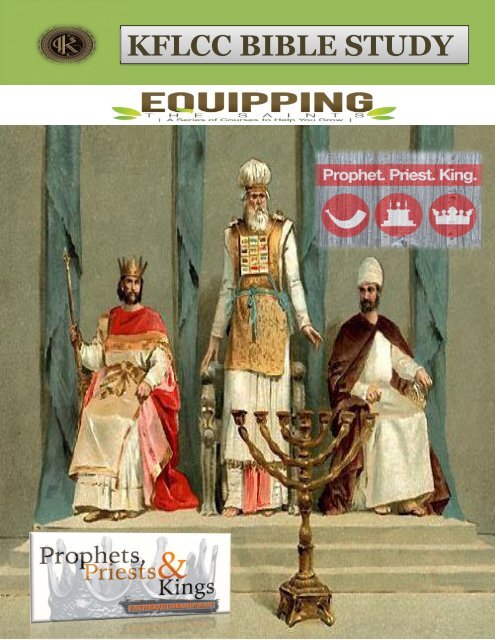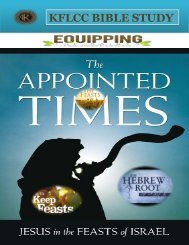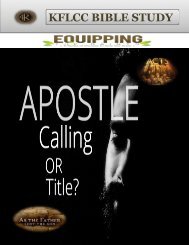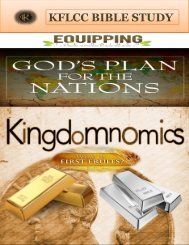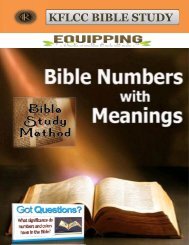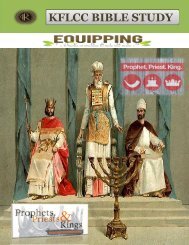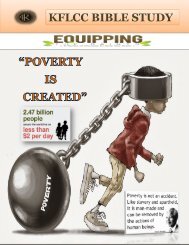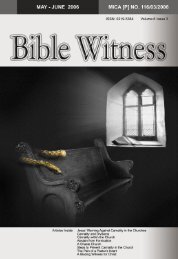Prophet Priest King II
Bible Study
Bible Study
You also want an ePaper? Increase the reach of your titles
YUMPU automatically turns print PDFs into web optimized ePapers that Google loves.
KFLCC BIBLE STUDY
Written by John Fesko<br />
Forwarded by Minister Damion Abrams<br />
One of the common criticisms leveled against the study of<br />
theology is that seldom does doctrine have an impact on the dayin<br />
and day-out living of our lives. The common cry is, “Who needs<br />
doctrine, just give me Jesus!” Nothing could be farther from the<br />
truth. To say that doctrine does not have an impact on the daily<br />
living of our lives is to say that God has no impact upon our<br />
lives. This, of course, is absurd. Let us see how a doctrine germane to Christology has<br />
practical implications for the lives of fathers. It was John Calvin in the 16th century that first<br />
gathered together the doctrinal truths that Christ is the prophet, priest, and king, par<br />
excellence. Calvin called this trio of roles the munus triplex, or the threefold office. The idea<br />
behind the munus triplex is that all of the Old Testament offices ultimately point to and is<br />
fulfilled in Christ. For example, Moses was one of the greatest prophets in the Old Testament<br />
(Deut. 34.10). It was his job to reveal the knowledge of God to Israel (e.g. Exo. 7.1ff). In his<br />
role as a prophet Moses ultimately points to Christ (Acts 3.22ff). Christ, for example, spoke as<br />
the prophet when He gave the true meaning of the Law over and against the misinterpretations<br />
of the Scribes and Pharisees in His Sermon on the Mount (e.g. Matt. 5.21-22). In like manner<br />
the High <strong>Priest</strong> was supposed to go into the Holy of Holies on the Day of Atonement and make<br />
a sacrifice on behalf of the people of Israel to atone for their sins
(Lev. 16). The role of the High <strong>Priest</strong> is ultimately fulfilled in Christ as the High <strong>Priest</strong><br />
according to the order of Melchizedek who has entered the heavenly Holy of Holies and<br />
intercedes for the people of God (Heb. 8-10). The same pattern holds true for the Old<br />
Testament office of <strong>King</strong>. It was <strong>King</strong> David, for example, that ultimately points forward to<br />
Christ in His role as the <strong>King</strong> of <strong>King</strong>s (e.g. Ezek. 37.24ff). Again, these<br />
Old Testament offices of prophet, priest, and king find their ultimate<br />
fulfillment and significance in the person and work of Christ. Now, in<br />
what way does this doctrine impact our day-in and day-out living?<br />
The munus triplex has practical implications for every believer because all of us are supposed<br />
to be conformed to the image of Christ (Rom. 8.29). This means that all of us should ask<br />
ourselves how we reflect each of these offices in our daily lives. The munus triplex, however,<br />
has special implications for fathers. God has ordained that man, or husbands, are supposed<br />
to be the spiritual heads of their families<br />
(1 Cor. 11.3ff; cf. Gen. 2). We find this pattern, for example, in Paul’s instructions to the<br />
Ephesians: “Therefore, just as the church is subject to Christ, so let the wives be to their own<br />
husbands in everything” (Eph. 5.24). The analogy is that the husband is representative of<br />
Christ and the woman is representative of the church. This means, then, just as Christ fulfills<br />
the roles of prophet, priest, and king for the church, the husband must fulfill these roles to his<br />
wife and of course his family.<br />
Fathers, do you fulfill the role of a prophet to your family? Do you instruct your wife and<br />
children in the Word of God? Do you read the Word of God to your children? Do you model<br />
the Word of God for your children in your living? Fathers, do you intercede on behalf of your<br />
family as a priest? Granted, only Christ can offer Himself as a sacrifice for sin on behalf of the<br />
church. This, however, is not the only function of a priest. Just like Christ offered up His high<br />
priestly prayer of intercession on behalf of the church (John 17.1ff) do you<br />
intercede in prayer on behalf of your family? Fathers, do you “love your<br />
wives, just as Christ also loved the church and gave Himself for her” (Eph.<br />
5.25)? Fathers, do you rule your households like a tyrant or as in the same<br />
manner that Christ our <strong>King</strong> rules over us? Christ our <strong>King</strong> humbled<br />
Himself, took on the form of a servant, was obedient unto death, even the<br />
death of the cross.<br />
(Phil. 2.7-8). Are you a servant-king to your family? Do we now see the<br />
practical relevance of the munus triplex? This doctrine has the practical<br />
implication that every father should be a prophet, priest, and king to his<br />
family. Fathers, meditate upon these truths this Father’s Day and ask God<br />
that He would enable you to fulfill the munus triplex to your family each<br />
day. Lastly, just one parting thought—if we ever think that doctrine has no practical<br />
implications, chances are we have never given the doctrine any serious thought.
By Keith Hoffman<br />
My family and I were enjoying an evening of dining and visiting with friends. While my wife<br />
chatted with Mary, Skip and I discussed the economy, world events, and business. As the<br />
evening floated by, our discussion drifted towards family. Skip then said something that<br />
captured my attention, for it related closely to my own experience. Even though he spoke in<br />
passing, his words dripped with insight.<br />
“My oldest son will be finished with school in 12 months. In 15 months, he will move out of the<br />
house forever. He will never live with us again. I won’t know what he is doing, and he really<br />
won’t care; he will have a life of his own. I know this, but just yesterday, I arrived home from<br />
work, ate a quick meal, and then went out to the yard and pulled weeds. After that, I washed<br />
the car and cleaned up the garage. When night fell, I went inside, gave the kids a hug, and<br />
went to bed. Another day passed and I spent perhaps all of eight minutes with my son. I am so<br />
obsessed with the urgent that I lose sight of the important.”<br />
I tried to encourage Skip, assuring him that being aware of the problem is half of the battle.<br />
Skip responded with an openness and honesty that I have come to appreciate and admire, “It<br />
may be half of the battle, but it is only half, and it is a battle.”<br />
Skip was right. Beyond his words, I understood exactly what he meant. The “important”<br />
meant being a vital part of his son’s life. “Important” meant using the limited time he has while<br />
his children live at home to shape and prepare them for life. “Important” meant fulfilling his role<br />
as a father in dimensions beyond being the breadwinner and caretaker of their property.<br />
“Important” meant doing the things that affect not only the lives of his children, but also those<br />
of generations to come.<br />
Skip’s words resonated within me, because I, too, had the same sense that I was not fully<br />
discharging my intended role as father. Like Skip, I am a conscientious provider, faithful and<br />
loving husband, and loving parent. We make a concerted effort to do things together as a<br />
family. Being with my wife and children is essential, and I realize that important modeling takes<br />
place while we are together. Even so, I sensed that spending time together in and of itself is<br />
not the answer. Deep within my being, awareness of a calling stirred my soul. It is this dull<br />
sense of the need to be intentional, at least some of the time, which remained largely<br />
unfulfilled.<br />
As I reflected back on Skip’s words and my own struggle with tending to the important, I<br />
realized that the struggle was not so much between the urgent and the important as with<br />
knowing what to do about the important. I had a passion for my family, but not an agenda. I
sensed the call to fill a role, but I did not know how to answer it. The real issue for me was not<br />
losing sight of the important, but failing to see my role and responsibilities in it.<br />
I believe human nature gravitates toward tasks that we understand, know how to accomplish,<br />
and can do well. Cleaning the garage is not so much urgent as it is in need of doing and I<br />
know how to do it. Fertilizing the lawn really can wait until tomorrow, but I have no pressing<br />
issues for my family’s agenda today. Until we comprehend our calling and flesh out our<br />
understanding with an actionable agenda, the battle between the urgent and the important<br />
continues. We will always tend to do the “urgent” things we understand in deference to the<br />
important things that are fuzzy and ill defined.<br />
The unfulfilled restlessness that Skip and I felt just below the surface of consciousness was<br />
the calling to go beyond being the provider, beyond being the caretaker, and beyond being a<br />
playmate and friend to our families. God has called us to be heads of our households.<br />
The Father has designed the family as the fundamental building block of society and<br />
assigned very broad responsibilities to the leader of this societal unit. Unlike a corporation,<br />
which often has many layers of management from top to bottom, His organizational chart for<br />
humanity is unbelievably wide and incredibly lacking in layers. The responsibilities He has<br />
assigned to us are not lost in the bureaucracy of divine order; they flow from God the Father,<br />
through Christ Jesus, and to the husband.<br />
Why is it, then, that our responsibilities sometimes seem so fuzzy and ill defined? Have you<br />
ever played the game where one person tells a story to another, who in turn repeats it to the<br />
next, and so on? After several renditions, it begins to lose its familiarity. Important details are<br />
omitted and new content is added to fill in the gaps. In the same way, each succeeding<br />
generation learns spiritual leadership primarily through the example of their parents. The<br />
cumulative effects of imperfect knowledge, poor execution, and sin lead us far from the truth in<br />
only two or three generations.<br />
Providentially, the Father prepared a written record and detailed model of His plan for<br />
leadership within the household. We need not invent new methods nor interpret past practices;<br />
the original plan of the Master Designer is intact and available for our use. We simply must<br />
return to Scripture and rediscover our call – to be the priest, prophet, and king to our<br />
household.<br />
I am by nature a highly competitive person, and up until 1995, I was obsessed with my<br />
career. My passions, goals, and dreams revolved around it, and I measured my value and<br />
worth as a person by my position on the corporate ladder. My wife, Libby, was not living with a<br />
husband, but with the Director of Engineering.<br />
To the casual observer, I was the model husband and father. We had our own home in the<br />
suburbs, food was on the table, and our children had shoes. I kept the yard neatly groomed,<br />
the house well maintained, and our cars sparkled in the driveway. I worked long hours, but still
found time to occasionally play tag with the children in the yard and do things as a family. I<br />
kept faithful to my wife, hugged the kids, and took them all to church twice every Sunday. I<br />
honestly thought that I was a great husband and father.<br />
Looking back, the view is quite different. Although I did not see it myself at the time, the truth<br />
was simple and clear; I brought home the bread and maintained the house and yard, and<br />
Libby met my needs as well as hers and the children’s. I did nothing more and nothing less,<br />
and I believed the arrangement was fair, equitable, and proper. Little did I realize how much<br />
more God expects of me.<br />
In 1995, the Father began convicting me of my failure to provide headship for my<br />
household. I did not understand what it involved, but I began to budget more time with my wife<br />
and children. My heart was still in my career, but I was at least more conscious of my<br />
responsibilities at home.<br />
My heart’s desire was obedience to the Father, but changes in my life were evolutionary<br />
rather than revolutionary. I did not know what He expected of me as a father, and I was<br />
addicted to the pursuit of my career. On December 31, 1997, I surrendered my career, my<br />
pride, and my security to God. I asked Him to take my life and make it what He wanted me to<br />
be.<br />
God, in His infinite wisdom, led me to resign from my engineering management position in<br />
January of 1999. My career had defined my identity, my status, and my security. It was a<br />
difficult addiction to break. For eight months, I went “cold turkey.” I had no position, no income,<br />
and no job. I was a “nobody,” except a child of God and a husband and father to my family.<br />
This was the beginning of healing and restoration for my household.<br />
I learned that spending time with my family is not a good measure of success as a father. It<br />
is like a college student showing up every day for class; it is great that she is there, but that<br />
does not earn her an “A.” In the same way, I do need to spend time with my family, but a much<br />
larger responsibility rests upon my shoulders.<br />
The question Skip implicitly asked during our conversation that Friday evening was, “Why<br />
do I know that there are important things to do with my family, but I tend to busy myself with<br />
urgent but less important duties?” I often asked that question myself as I locked the doors and<br />
turned out the lights to tuck in another day.<br />
Perhaps you hear the call to assume a greater role as head of your household. You may<br />
sense distraction by the pursuit of career, sports, possessions, or hobbies. You may be<br />
struggling to balance the physical, emotional, spiritual, and financial demands of career and<br />
home. The urgent has you tight within its grip, while the important remains elusive. The goal of<br />
this book is to encourage you to embrace your calling, authority, and responsibility: to fulfill the<br />
roles of priest, prophet, and king in your household.<br />
We do not hear it often preached from the pulpits, and it certainly is not a part of our culture,<br />
but God has clearly charged husbands and fathers with serious responsibilities, and we will be<br />
held accountable. Many wives, single moms, and emotional widows will attest that they have<br />
indeed been left holding the bag while the men have squandered their responsibilities.
As I struggled to provide Biblical leadership within my household, I began to realize that the<br />
roles and responsibilities God ordained to fathers were unclear to me. The goal was clear; I<br />
wanted to care for and protect my wife and children. I wanted them to love God and intimately<br />
know Him. The hard part was consistently translating that goal into actions.<br />
Have you ever observed someone who clearly knew what they wished to accomplish but did<br />
not know how to do it? When my youngest son was perhaps four or five, he played soccer with<br />
a rather large group of fellow first-time players. Everyone (I think) knew that the object of the<br />
game was to keep the soccer ball out of his or her own net and kick it into the opponent’s goal.<br />
The objective was easy to understand, even for young, inexperienced, and untalented players.<br />
They played with great effort and enthusiasm, and it was fun to watch. No one played roles or<br />
positions; they swarmed around the ball five people deep as it followed the path of least<br />
resistance.<br />
Eventually, the swarm began to thin out, and kids started hanging back. Did they suddenly<br />
and intuitively find their positions on the field? No, they hung back because they just gave up,<br />
realizing that their attempt to participate was futile. It was at this point that the coach called<br />
them to the sideline and began to instruct them in the various positions and roles of a team. It<br />
was a modest start to be sure, but the game took on a new dimension when they returned to<br />
the field.<br />
I sometimes found myself standing at the sidelines of my family, not because I did not<br />
understand the goal or wish to participate. I simply needed more coaching to grasp my<br />
assigned position and the responsibilities that go with it. I needed a game plan. Uncertain of<br />
my position within my family, I busied myself with the urgent and failed to do the important.<br />
We discover a husband’s call to be priest, prophet, and king to his household in the Book of<br />
Ephesians. The Father compares the headship of a husband to the headship of Christ, “For<br />
the husband is the head of the wife as Christ is the head of the church, his body, of which<br />
he is the Savior” (Ephesians 5:23, emphasis added). Right along side this verse, husbands are<br />
called to love their wives and give themselves up for her following the example of Christ to the<br />
Church, “Husbands, love your wives, just as Christ loved the church and gave himself up<br />
for her” (Ephesians 5:25 emphasis added). Ephesians 5:23 states a fact, “the husband is the<br />
head of the wife.” Ephesians 5:25 is a command, “Husbands, love your wives,” directing<br />
husbands to a life of sacrificial service to them. As a husband, I must pay close attention to this<br />
comparison and command!<br />
Looking deeper, the Greek word for “as” (hos) in Ephesians 5:23 means “in the manner of.”<br />
The Greek word for “just as” (kathos) in Ephesians 5:25 has the sense of “in the amount and<br />
manner of.” Putting it all together, a husband is the head of the household in the manner that
Christ is the Head of the Church, and he must express his love to his household in the amount<br />
and manner that Christ loved the Church.<br />
How is Christ the Head of the Church? He expresses His headship or authority over the<br />
Church through the offices of <strong>Priest</strong>, <strong>Prophet</strong>, and <strong>King</strong>. How does Christ serve and express<br />
His love for the Church? He loves and serves the Church by performing the duties associated<br />
with these roles.<br />
As I studied the Word, the Holy Spirit spoke to my heart and I began to understand the<br />
position that God has assigned to us. I saw a pattern for spiritual leadership established first in<br />
ancient Israel, then perfected in Christ, and finally given to us as a model of leadership within<br />
the household. When I understood my position and how to apply my roles, the battle between<br />
the urgent and the important suddenly shifted in my favor.<br />
While we are familiar with Jesus’ use of simple parables to teach deep meaning, Our<br />
Father’s use of symbols is evident as He progressively revealed Himself to humanity through<br />
the offices of <strong>Priest</strong>, <strong>Prophet</strong>, and <strong>King</strong>. These ancient offices provide meaning and<br />
understanding beyond their original application. Each is rich in symbolism preceding the<br />
perfect revelation provided in Christ. Nevertheless, the representation does not stop there; the<br />
Father extends the same leadership pattern to the husband as head of the household.<br />
The Father developed the formal priesthood in ancient Israel to draw His people close to<br />
Himself. The priest brought an awareness of sin, and called the people to repentance. Through<br />
ceremonial cleansing, the priest was able to draw near and offer sacrifices to God. A priest<br />
shedding the blood of a lamb for the atonement of sin had contemporary significance in<br />
ancient Israel, but he is also a type of Christ, our Great High <strong>Priest</strong> (Hebrews 4:14), shedding<br />
His blood for our sins. He died to draw us to Himself (John 12:32). A father, as priest to his<br />
family, must be cleansed from sin and draw close to God. He must bring awareness of sin to<br />
his household and lead them into repentance. He must draw his family to the Father in an<br />
environment where they acknowledge Him in the everyday operation of the home.<br />
When Israel became enamored with religion rather than the Father, He raised up prophets<br />
to bring life to their empty routine. They walked boldly, warned of danger, and brought<br />
application to God’s message. The prophets of old revealed the Father through their words,<br />
but Christ as the Word in flesh (John 1:14) perfectly revealed Him.<br />
“Anyone who has seen me has seen the Father. How can you say, ‘Show us the Father’?<br />
Don't you believe that I am in the Father, and that the Father is in me?” (John 14:9b-10a).<br />
Jesus brought us out of the law and into a relationship with the Father. A husband, as prophet<br />
to his household, must bring his family out of religion and into a vital relationship with the<br />
Father. He must be a man of prayer. He must watch for evil, confront sin, and move the Word<br />
off from the page and into application within his home.<br />
Following revitalization by the prophets, Israel was prepared to pursue her mission. God<br />
raised up kings who trained warriors for battle, engaged the enemy, and defended the
kingdom. David was perhaps the pinnacle of earthly leadership, but he is also a type of Christ<br />
as <strong>King</strong> (John 18:36-37). He equips us and goes before us in battle as we fulfill His mission.<br />
A husband, as king to his household, raises up a standing army of warriors for Christ. He<br />
trains his family in righteousness. He unifies his household as a unit and leads them in battle.<br />
He knows his mission and defends it to death.<br />
The Father has provided a perfect job description and model for us as the head of our<br />
household, but we must lovingly apply the headship and love modeled by Christ to the Church.<br />
The roles are huge, and we have much to learn. Nevertheless, when we understand how<br />
Jesus leads and loves the Church, we have a model to follow and an agenda to fill. This book<br />
is devoted to communicating the roles of priest, prophet, and king, and explaining how to apply<br />
them within your household.<br />
This is not an exercise in intellectual gymnastics. While I studied intensely for over one year<br />
to understand the roles of priest, prophet, and king, I will spend the rest of my life applying<br />
these principles within my household. I am far from perfect, but I now have a perfect model to<br />
pursue. After more than twenty years of marriage, I now know that I am heading in the right<br />
direction.<br />
I, along with many men, have blown it as a godly leader for my family. Although I am<br />
physically present in my home, many times I have forsaken my responsibilities out of<br />
ignorance, fear, or indifference. When I have assumed leadership, I too often have modeled<br />
the world’s distorted view of leadership as privilege and position, rather than the biblical view<br />
of duty and responsibility. My wife and children rightly resist treatment as an inferior species.<br />
Being lords over our families clearly is not God’s design or intent for leadership within our<br />
homes. We must have a biblical understanding of authority if we are to exercise leadership as<br />
the Father intends.<br />
Shalom,<br />
Apostle Gary Carter, Jr.


